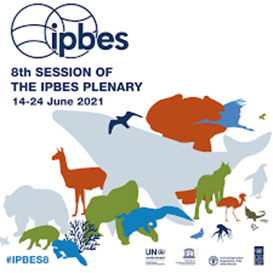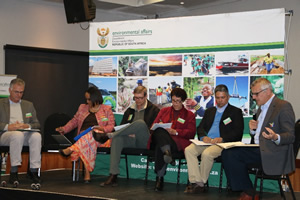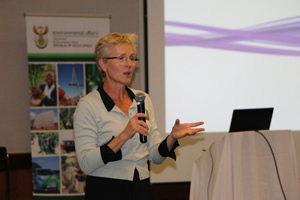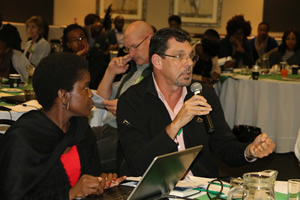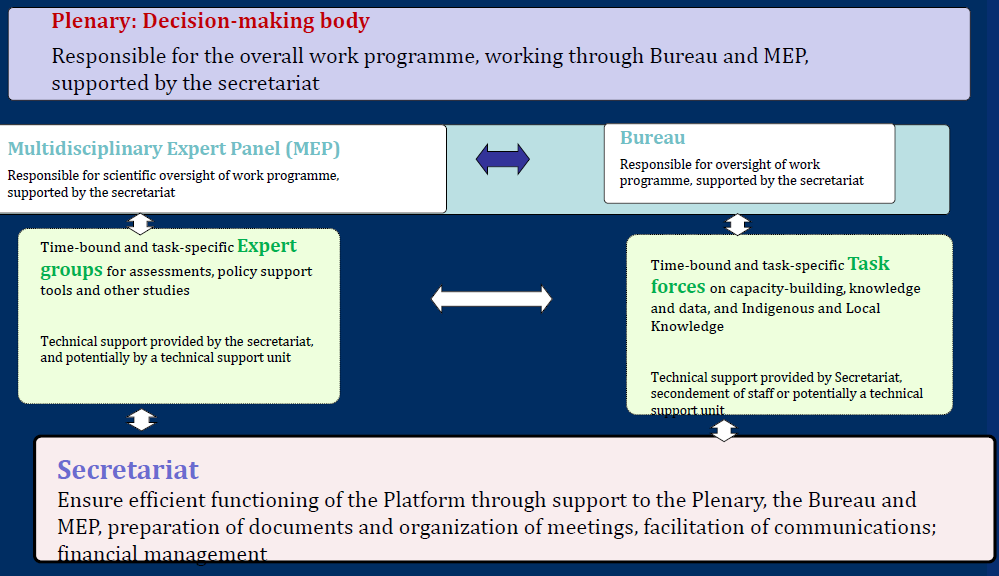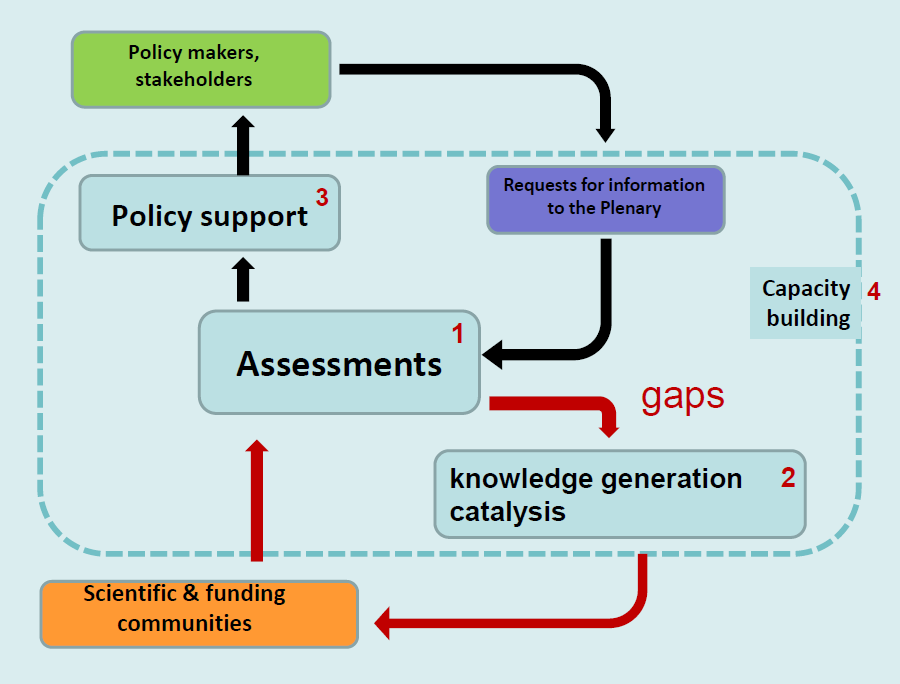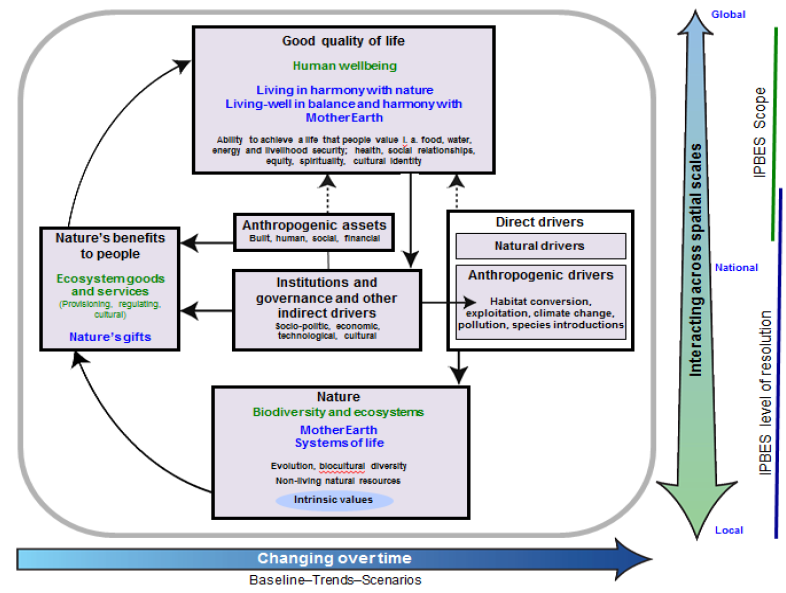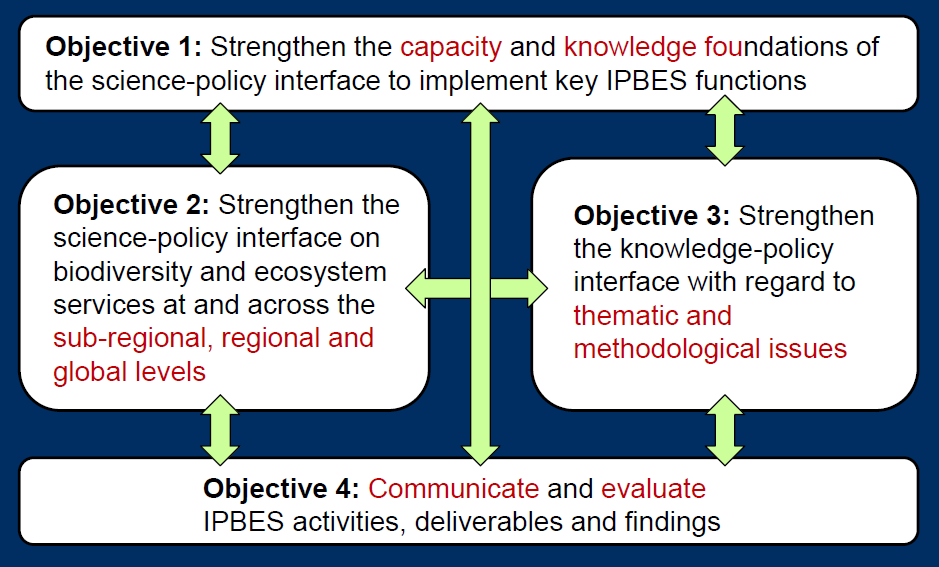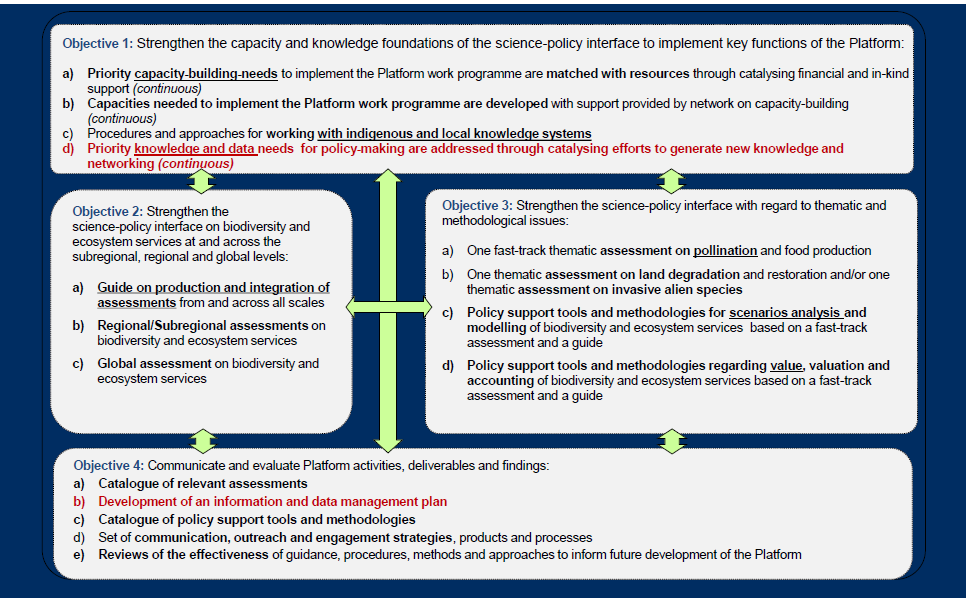Intergovernmental Platform on Biodiversity and Ecosystem Services (IPBES)
Latest developments
Notification: Call for comments on the Review of the draft nature futures framework
Dear IPBES members, observers and other interested stakeholders,
With reference to notification EM/2021/20 (10 August 2021), IPBES is pleased to announce the start of the external review of the draft nature futures framework and methodological guidance. The external review is open from 6 September 2021 to 31 October 2021.
Previous engagements
Notification: Call for nominations of experts to participate in the thematic assessment of the interlinkages among biodiversity, water, food and health (nexus assessment) and the thematic assessment of the underlying causes of biodiversity loss and the determinants of transformative change and options for achieving the 2050 Vision for Biodiversity (transformative change assessment)
Dear IPBES stakeholders,
The DFFE invites submission of nominations of experts to participate in the nexus and transformative change assessments.
All governments, national, sub-national and local and relevant organisations, academia or other institutions are encouraged to submit nominations. Nominated experts should have strong multidisciplinary or interdisciplinary expertise, expertise in one or more disciplines of natural science, social science or the humanities, be indigenous and local knowledge experts or have expertise in indigenous and local knowledge systems. IPBES also encourages policy experts and practitioners to apply. All nominees should have experience in working within interdisciplinary, international and/or global contexts.
This year’s eighth plenary session of the Intergovernmental Science-Policy Platform on Biodiversity and Ecosystem Services (IPBES) will be held online from the 14 to 24 June 2021 due to the ongoing COVID-19 pandemic. Virtual plenary sessions are expected to be held from 12:45 to 14:45 PM and from 15:15 to 17:15 PM each day. Regional consultations were held prior to the IPBES 8 from 7-11 June 2021 and stakeholder days were held from 3-9 June 2021.
The IPBES 8 plenary will consider for adoption the scoping report for a thematic assessment of the interlinkages among biodiversity, water, food, and health (nexus assessment) and the scoping report for a thematic assessment of the underlying causes of biodiversity loss, and the determinants of transformative change and options for achieving the 2050 vision for biodiversity (transformative change assessment). Participants will also discuss the report of a recent workshop on biodiversity and pandemics as well as work related to the interlinkages between biodiversity and climate change, and collaboration with the Intergovernmental Panel on Climate Change (IPCC), including the report of a co-sponsored workshop on biodiversity and climate change.
Other items on the IPBES 8 agenda include:
- Progress in the implementation of the IPBES rolling work programme up to 2030;
- Progress in building capacities, strengthening knowledge foundations, and supporting policy;
- Improvement of the Platform’s effectiveness;
- Institutional arrangements, including the United Nations collaborative arrangement for the work of the Platform; and
- Financial and budgetary arrangements.
Taking advantage of the plenary’s virtual platform for the 8th Plenary Session, the South African delegation to IPBES 8 comprises officials from the Department of Forestry, Fisheries and the Environment (DFFE); South African National Biodiversity Institute (SANBI) and South African National Parks (SANParks).
More information on the plenary, along with the other official documents of the meeting, are available on the IPBES website: https://www.ipbes.net/event/ipbes-8-plenary or contact Nanda Nzimande (NNzimande@dffe.gov.za) or Vutivi Vukeya (VVukeya@dffe.gov.za). For National issues related to the participation of SA delegation to IPBES 8, please contact the IPBES National focal point: Dr Kiruben Naicker (knaicker@dffe.gov.za).
The seventh session of the Intergovernmental Science-Policy Platform on Biodiversity and Ecosystem Services (IPBES) Plenary, is to take place from 29 April to 4 May 2019, in Paris, France. On Sunday, 28 April 2019, regional consultations and the IPBES Stakeholder Day will be held. The seventh session of the Plenary will be opened at 10 a.m. on Monday, 29 April 2019. An opening ceremony will take place on Monday evening. The session is scheduled to close on Saturday, 4 May 2019.
At this very important session, the Plenary will be invited to consider for approval the summary for policymakers of the global assessment of biodiversity and ecosystem services and for adoption the future work programme for IPBES. The Plenary will receive a report on the review of IPBES at the end of its first work programme. It will also consider financial and budgetary arrangements. An information note concerning logistical arrangements, along with the other official documents of the meeting, is available on the IPBES website (https://www.ipbes.net/event/ipbes-7-plenary).
South African delegation to the IPBES7 Plenary comprises of delegates from South African National Parks (SANParks), South African National Biodiversity Institute (SANBI) and officials from the Department of Environmental Affairs (DEA). The delegation will travel to Paris to negotiate and strengthen the science-policy interface.
IPBES Pollinators Assessment Now Available
The IPBES is very pleased to inform you that all chapters, and their executive summaries, of the IPBES thematic Assessment on Pollinators, Pollination, and Food Production are now available to download on the IPBES website at https://goo.gl/QKpaZ4. An attractive, laid-out version of this document is also being prepared and will be made available online soon.
Shaping the right questions together, that science can begin to answer
The environment sector is complex and can provide some of the most challenging policy contexts: situations of crisis such as natural disasters in the face of climate change: erratic weather patterns of drought, storms and flooding which can have devastating impacts on the livelihoods of people, biodiversity loss and the subsequent socio-economic impact on society and then we have equity and poverty issues, access to natural resources where promotion of the green and biodiversity economy, trade, sustainable use can create a skewed society. All of these issues can give rise to situations where the necessary evidence can be in conflict with political views and socio-economic imperatives, and more so when evidence must cross geopolitical borders and cultures. It is, therefore, important to recognise the broad and diverse socio-economic context of our country in which science and evidence is undertaken and applied. Therefore, there should indeed be a greater commitment for collaboration amongst both the policy makers, scientific and evidence communities to advance the principles of accountability in brokering the necessary and appropriate knowledge that can both honour and transcend our diversity whilst sustainably managing our environment. It was for these reasons that the Department of Environmental Affairs hosted the inaugural Biodiversity Evidence and Research Indaba.
Panel of experts, representing both stakeholders and policy-makers From left to right: (Prof John Donaldson, Mr. Danie Pienaar, Prof May Hermanus and Dr. Ian Goldman)
Louise Shaxson from the Overseas Development Institute, facilitating a discussion on, scaling evidence-based policy making in sector policy themes.
It was in such a spirit that the Indaba was convened, to start a domestic dialogue across sectors, with key stakeholders on the best approaches for environmental research, whilst identifying and strengthening interventions of scientific evidence to influence decision and policy making. The inaugural event attracted over 90 participates from across various sectors, including members of the DPSA (Department of Public Service and Administration) and DPME (Department of Planning, Monitoring, and Evaluation), as well as representatives from numerous external entities, and members from provincial branches.
The Department of Environmental Affairs is committed to this government-wide agenda of research and evidence gathering for decision and policy making. Our commitments are guided by the Environment Sector Research, Development and Evidence framework, approved in 2012, which is within the national research agenda of the country as framed by the National Research & Development Strategy in 2002, the Ten-Year Innovation Plan of 2008 and the 2012 Global Change Research Plan, led by the Department of Science and Technology (DST).
This agenda was further aligned to the research and evidence drive of the Department of Performance Monitoring and Evaluation in the Presidency as well as the Department of Public Service and Administration on guiding improvement of the efficiency and efficacy of the public administration.
Our commitments extend further to the extent where the Department of Environmental Affairs has institutionalised the science-policy interface as an internal strategic objective. This approach has been recognised through the VakoYiko Partnership Consortium which piloted the Department of Environmental Affairs as a case study for the use of research and evidence in decision making and policy development. The VakoYiko project was done in partnership with the overseas development institute (ODI), HSRC (Human Sciences Research Council) and CSIR (Council for Scientific and Industrial Research) funded through the UK DFID (Department of International Development).
Interactive sessions, which saw both stakeholder and policy-maker engagement.
Globally, scientific advisory councils are the norm where chief scientific advisors bridge the interface between science decision and policy making. In South Africa, we have adopted the Ministerial Technical Working group system highlighted in the diagnostic report of the VakoYiko project, which is now contributing towards the development of a change strategy for the Department.
The VakoYiko project is sadly coming to an end in December this year, but the Department through the Branch: Biodiversity and Conservation have significant best practices which have given the sector the edge to advance the science-policy interface to other policy themes in the sector. Firstly, the Biodiversity Act has made provision for the establishment of the South African National Biodiversity Institute with the mandate to conduct research, which over the years, since its establishment, have provided a historic culture of a practice of science informing policy.
The Department is also an active pioneer member of the Intergovernmental platform on Biodiversity and Ecosystem services (IPBES) which is a science policy platform, established in 2012. South Africa is also the host country for the IPBES technical support unit for the African regional assessment, administered by the CSIR
It was, therefore, encouraging to see members of the science and policy fraternity coming together and participating in the first Research & Evidence Indaba which marked a milestone moment in strengthening government’s research and evidence drive to support decision making, policy diagnosis, development, implementation, and evaluation. The department is proud to announce the success of this event in highlighting an agenda that balanced evidence, social values and other imperatives in the public policy sphere.
IPBES 5 PLENARY TOOK PLACE FROM THE 7th to the 10th March 2017
IPBES approved the following decisions;
- Hosting the sixth session from Sunday, 18 March to Saturday, 24 March 2018 in Medellin, Colombia.
- The implementation of the first work programme of the Platform.
- Accepting the European Union as an enhanced observer to the Platform.
- The Catalogue of policy tools and methodologies to undertake an evaluation and to report to the Plenary at its sixth session.
- Reflecting on the implementation of the four functions of the Platform from the first work program.
- Recognising and working with indigenous and local knowledge for the participatory mechanism.
- The adoption of the scoping report on Sustainable Use of Biodiversity (Wild Species).
- Undertaking an internal review and report the findings at its sixth session.
- Considering a revised budget for the financial year 2017-18, including the remaining period of the work program of the platform.
A draft report is available on www.ipbes.net
Introduction and background
The South African Government through its Department of Environmental Affairs is committed to evidence-based decision making. Through strengthening the science-policy interface South Africa has supported the establishment of the Intergovernmental Science-Policy Platform on Biodiversity and Ecosystem Services. The objective was to strengthen the science-policy interface for biodiversity and ecosystem services for the conservation and sustainable use of biodiversity, long-term human well-being, and sustainable development.
What is IPBES
- Intergovernmental Platform on Biodiversity and Ecosystem Services (IPBES)
- Overall objective: To provide policy-relevant scientific knowledge to inform decision making
- Established in April 2012, Panama
- 118 Members-SA played an instrumental role in IPBES est. and is a pioneer member
- Secretariat hosted in Bonn, Germany
Principles of IPBES
- Address terrestrial, marine and inland water biodiversity and ecosystem services and their interactions
- Inter- and multidisciplinary approach
- Gender equity
- Collaboration - avoiding duplication
- Full participation of developing countries
- Policy-relevant but not policy-prescriptive
- Scientific independence, credibility, relevance, and legitimacy
- Contribution of indigenous and local knowledge
How is IPBES organized
What will IPBES do?
IPBES was established with four greed functions:
| Knowledge generation | Identify knowledge needs of policymakers and catalyse efforts to generate new knowledge |
| Assessment | Deliver global, regional and thematic assessments, and promote and catalyse support for sub-global assessment |
|
Policy support tools |
Identify policy relevant tools/methodologies, facilitate their use, and promote and catalyse their further development |
| Capacity building | Prioritize key capacity building needs and provide and call for financial and other support for priority needs |
Four functions of IPBES
IPBES analytical conceptual framework
Structure of the work programme
16 deliverables
Institutional arrangements
Mechanisms agreed at IPBES -2:
- Expert groups: time-bound and task specific expert groups established for specific deliverables
- Task forces: smaller groups established to consider a specific topic or question and how IPBES will address it
- Forum on capacity-building: periodic meeting with potential donors to highlight priority needs
- Technical support units (TSU): to coordinate and support the activities of working groups and task forces
National investment
In response to international obligations as well as those within the Department of Environmental Affairs Environment Sector, Research, and Development Framework, the Branch Biodiversity & Conservation has established a Directorate: Science-Policy Interface.
Goal: To provide overall strategic scientific intelligence and leadership in the Directorate: Science Policy Interface - through the coordination of specialist scientific advisory services and research for effective Biodiversity and Conservation decision making.
Objectives:
- To provide a science policy interface for the Biodiversity Sector
- To coordinate expertise across different sectors and research councils for Biodiversity Research
- To provide an analytical and advisory service on scientific developments and trends arising from SA’s obligations in terms of biodiversity-related Multilateral Environmental Agreements
- To monitor and evaluate the implementation of National Strategies, programmes, and projects
- To coordinate and manage key flagship projects and programmes to enhance the intelligence/content of the sector.
South African IPBES Experts
Below is an l list of the current South African IPBES Experts and their relevant area of expertise
Core National IPBES HUB:
Expert: Deliverable 4c: Development of the guide and catalogue on policy support tools
Expert: Deliverable 4c: Development of the guide and catalogue on policy support tools
| Name | Organisation | Focal Area |
|---|---|---|
| Dr. Luthando Dziba | CSIR | Expert: Deliverable 1d: Generation, access, and management of knowledge and data |
| Dr. Colleen Seymour | SANBI | Expert: Deliverable 3a: Assessment on pollinators, pollination, and food production |
|
Dr. Ruan Veldtman |
SANBI |
Expert: Deliverable 3a: Assessment on pollinators, pollination and food production |
|
Dr. Belinda Reyers |
CSIR | Expert: Deliverable 1d: Generation, access, and management of knowledge and data |
| Dr. Klaus Kellner | NW University (Potchefstroom) | Expert: Deliverable 3c: Methodological assessment on scenario analysis and modelling |
|
Dr. Klaus Kellner |
NW University (Potch) | Expert: Deliverable 3c: Methodological assessment on scenario analysis and modelling |
| Dr. Nicholas King | Independent | Expert: Deliverable 3c: Methodological assessment on scenario analysis and modeling |
| Dr Patrick O’Farrell | CSIR | Expert:3d: Methodological assessment on diverse conceptualizations of value |
| Dr. Joel Houdet | Synergiz | Expert: Deliverable 2b:set of regional and sub-regional assessments |
| Dr. Anton Pauw | Stellenbosch Univer sity | Expert: Deliverable 3a: The fast Track Thematic Assessment of Pollinators, Pollination and Food Production |
| Dr, Mduduzi Ndlovu | WITS | Expert:2b: set of regional and sub-regional assessments |
| Dr. Louis Celliers | CSIR | Expert:2b: set of regional and sub-regional assessments |
| Balgis Osman- Elasha | African Development Bank | Expert:2b: set of regional and sub-regional assessments |
| Benis N. Egoh | CSIR | Expert:2b: set of regional and sub-regional assessments |
| Brian van Wilgen | CSIR | Expert:2b: set of regional and sub-regional assessments |
| Chris Dickens | IWNI | Expert:2b: set of regional and sub-regional assessments |
| Claire Ntshane | SanParks | Expert:2b: set of regional and sub-regional assessments |
| Emma Archer Garderen | CSIR | Expert:2b: set of regional and sub-regional assessments |
| Graham von Maltitz | CSIR | Expert:2b: set of regional and sub-regional assessments |
| James Gambiza | Rhodes University | Expert:2b: set of regional and sub-regional assessments |
| John Morris | ISS and Synergiz | Expert:2b: set of regional and sub-regional assessments |
| Kaera Coetzer | WITS | Expert:2b: set of regional and sub-regional assessments |
| Laura Pereira | UCT | Expert:2b: set of regional and sub-regional assessments |
| Lindsey Gillson | UCT | Expert:2b: set of regional and sub-regional assessments |
| Mathieu Rouget | UKZN | Expert:2b: set of regional and sub-regional assessments |
| Philip Ivey | SANBI | Expert:2b: set of regional and sub-regional assessments |
| Phumza Ntshotsho | CSIR | Expert:2b: set of regional and sub-regional assessments |
| Reinette Biggs | Stellenbosch | Expert:2b: set of regional and sub-regional assessments |
| Sebataole Rahlao | SANBI | Expert:2b: set of regional and sub-regional assessments |
| Thomas Bornman | SAEON | Expert:2b: set of regional and sub-regional assessments |
National focal point
| IPBES Focal Point Kiruben Naicker: Director Science Policy Interface | |
| Telephone No. | +27 12 399 9622 |
| knaicker@dffe.gov.za / kiruben@gmail.com |
|


